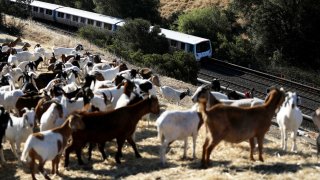
BART is employing goats to reduce fire risk and cut noise pollution on hillsides along train routes in the Bay Area, continuing a practice that began about five years ago and has created other unintended benefits.
Transit agency officials say the four-legged weed-eaters offer advantages to using lawn mowers and other power tools, which carry higher risk of sparking fires and create air pollution.
The goats can maneuver steep hillsides more easily and make much less noise than gas-powered brush-cutting machines, thereby decreasing any disruptions to neighboring areas, said Glen Eddy, BART's assistant superintendent of way and facilities, grounds maintenance.
Prior to the goats' arrival, BART would plow or mow grass and weeds, Eddy said in a news release, "but in many locations, there just isn't room for equipment to get in there."
Get a weekly recap of the latest San Francisco Bay Area housing news. Sign up for NBC Bay Area’s Housing Deconstructed newsletter.
BART's 450 goats are contracted from the Coalinga-based, family-owned business Living Systems Land Management, which owns about 4,000 goats. The animals are a cross between Spanish and Boer goats, breeds ideal for this type of work because they typically eat every edible morsel in sight. The goats also work faster than any human could, Eddy said in the statement, clearing about one acre each day.
The goats mow anywhere from 5 to 25 acres at each location where they're grazed. The goats' work typically costs BART about $800 to $1,200 an acre, and they usually work for about six weeks in the fire-prone summer months.
An unintended benefit from the project is that the work has enabled the goat herder to put his four children through college.
Herder Zenobia Mancha stays with the goats 24 hours a day, sleeping in a trailer beside the grazing property at night to ward off predators, such as mountain lions, and to make sure the goats don't escape.
Mancha, a Peruvian national who worked as an electrical engineer back home, has resided in the United States on an H-2A temporary agricultural worker visa for nearly three years. He intends to return to Peru -- with the hope of one day settling in the U.S. permanently -- at the end of this year. The herding work, he said, has enabled him to put his four children through university. Two of his children are now engineers, one is studying accounting and another law.
Back home in Peru, Mancha grew up around grazing animals. His 80-year-old father still maintains a herd of sheep, he said. The work can be challenging -- and lonely -- but it's worth it for Mancha, who takes great pride in his children's educations.
"There's a lot of pleasure in life," Mancha said beaming, "But nothing like the pleasure of educating your children."